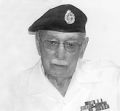L/Bdr. L.P. ‘Jack’ Cockrell, R.C.A.Of the 125 Canadian troops who boarded the Nerissa only 35 survived. Jack was one of these soldiers. He showed tremendous courage in the 9 hours he spent in the North Atlantic waiting to be rescued. The following is Jack’s statement from the "Court of Inquiry":
These are some of Jack’s memories from Douglas How’s article "In Search of the ‘Charmed’ Nerissa":
ObituaryCOCKRELL, Lionel Philip (Jack) Passed away suddenly on the snowy evening of December 21, 2008. He was born in Norwich, England on the 28th of October 1918. Jack and his family emigrated to Vancouver, B.C. in November 1922. Only a few months later, due to family misfortune he was placed in an orphanage and later became a ward of the Children's Aid Society. Jack received his early education in Vancouver. He joined the Militia in 1934. Two years later Jack joined the permanent force at Work Point Barracks as a member of the 5th Heavy Battery, R.C.A. It was during this time he met his future wife Dorothy McVie. The young couple were married in Esquimalt, at St. Paul's Anglican Church on December 2, 1939. At the outbreak of W.W. 2 Jack served for short periods of time at Black Rock, Breakwater Battery and Golf Hill until posted overseas to the 1st Field Regiment R.C.H.R. Jack survived the sinking of the R.M.S. Nerissa in April 1941. He was commissioned at the Royal Military Academy in February 1944 and posted to the Royal Canadian Armoured Corps. He served in Europe with the 25th Armoured Regiment and the 28th (B.C.R.) Regiment. Jack was wounded in October 1944 and was returned home to Victoria, B.C. a few months later. After a period of convalescence he served for a brief time with the Royal Canadian Dragoons. Jack left his military career in September of 1947 to join the Federal Civil Service (D.N.D) as an Ammunition Examiner at Colwood. A promotion to Assistant Chief Inspector meant a cross country move to Ottawa. The next move took the family to Bedford, Nova Scotia where Jack became Superintendent of the Ammunition Laboratories. A further promotion meant a move back to Ottawa with even greater responsibilities. The next chapter in Jack's career was with the Federal Government's Indian Affairs and Northern Development Branch. He served as a senior consultant with Parks Canada, Indian Affairs and the Department's Administration and Finance unit. His work resulted in extensive travel both in Canada and foreign countries. Jack claimed that these were his happiest, most challenging and productive days of his working life. A massive heart attack at the age of 58 brought an end to his employment with the Federal Civil Service. As soon as Jack regained his strength, he went back to work on a contractual basis with Park's Canada and successfully completed several projects before ""calling it a day"". Retirement brought Jack and Dorothy back to Vancouver Island, where Jack devoted the same energy and enthusiasm to volunteer work as he had to his military and public service careers. Dorothy formed a band and taught Jack to play the drums, for the next 15 years they played at many afternoon tea dances and entertained at care homes and charity events. As a member of Branch #91 of the Royal Canadian Legion, Jack served as President, as a Service Officer, Chairman of several committees as well as Zone Commander for South Vancouver Island. His major projects for the Legion were organizing the B.C. Ceremony for the Tomb of the Unknown Soldier and the Memorial Wall in Victoria's new arena. Jack continued to serve on committees until reaching his 86th birthday. Jack was predeceased by his parents Horace and Elsie. His sisters Marjory and Dorothy. He is survived by his wife Dorothy, sister Kathleen Clifton, Vancouver. Sons Robert Cockrell (Lesley) Victoria, John Cockrell (Pam) Rocklin, California, and daughter Maureen Miller (Dave) Nepean, Ontario. Grandchildren, John (Heather) Salem, Oregon, Carrie Ann (Daryl) Rocklin, California, Shannon Miller, Ottawa, Ontario, Jessica MillerPoos (Mark) Ajax, Ontario. Great grandchildren, Hayley, Evan, Calli, Jacob, Brianna, Jazzlyn and new baby Ella Claire. Many nieces, nephews as well as great nieces and nephews. A special thank you to Joanne and Greg for all their support and friendship to Dorothy and Jack over the past few years. Jack was a man who strongly believed in service to country and community. He loved a challenging debate, a good laugh and the Toronto Maple Leafs, but most of all he loved his family and his good buddy Fuji. He will be deeply missed! Memorial service to be held at a later date. Notification of time and place will appear in the Times Colonist. In lieu of flowers, donations may be made in Jack's name to the Heart & Stroke Foundation, 107-1001 Cloverdale Avenue, Victoria, V8X 4C9. 519025
|

Herb Coles "Remembrance Day" Story Capt. Gilbert Ratcliffe Watson Court of Inquiry & Official Documents Wartime Evacuation and the Children's Overseas Reception Board Memorials - In Honour & Remembrance Location of the Nerissa Sinking using Radio Messages and Co-ordinates
|
|
© 2004 SS Nerissa +++ All rights reserved |
